Film Inquiry Recommends: Great Dialogue Driven Films

Alex is a 28 year-old West Australian who has a…
Over at our official Facebook page , we are currently posting daily Film Recommendations, with each week being a different theme. This is a collection of those recommendations! This week’s theme is Great Dialogue Driven films. These are films which excel at the art of dialogue and don’t rely on overt special effects to deliver cinematic entertainment. Whilst most people point to Aaron Sorkin and Shane Black when referring to great dialogue writers, these are some more underrated examples.
1. My Dinner With Andre (1981, Louis Malle)
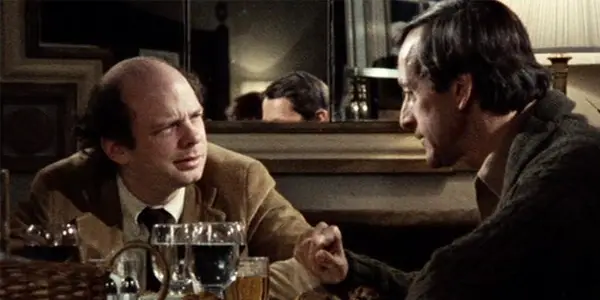
One of the kingpin films of dialogue-centric cinema, My Dinner With Andre, is a cinematic experiment created by its two leading actors, Wallace Shawn and Andre Gregory. The film is a great example of how important good dialogue is to a film and how engaging it can be. The story is about Wallace Shawn (both actors are playing fictionalised versions of themselves) meeting with his friend Andre Gregory, a theatre friend who had cut contact with everyone and gone travelling for several years. The conversation evolves from civil small talk to Andre’s overseas experiences then to Wallace’s apposed view on Andre’s brand life approach, with each member making intelligent conversation about their opposing views on how to live life and other things.
Malle makes sure the audience never gets bored whilst watching the film, constantly changing the camera angles and movement, without it being too distracting, allowing the actors and their dialogue to be front and centre. The film is helped by the two members being genuine friends, so their chemistry on-screen works well and their conversation feels natural, rather than forced or overtly-scripted. Fans of Ingmar Bergman or more intelligent adult cinema should definitely see this.
2. GlenGarry Glen Ross (1992, James Foley)
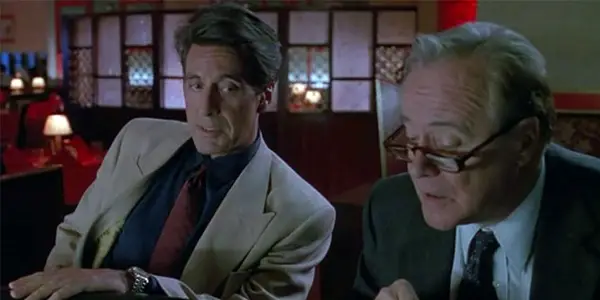
The movie adaptation of David Mamet’s famous play is one of the better theatre to film transitions. The problem with most theatre adaptations turned films is that they often feel too theatrical, not being able to shed their theatre aspects and making a film which feels like a televised play, not something that has the expanded use of cinema attached to it to realise elements which a play cannot (An example of this is last year’s Into The Woods, a film which sticks too closely too its Broadway origins rather then using cinema to expand it’s story and visual aspects). GlenGarry Glen Ross does embrace its theatre origins, but uses enough scene changes and camera movement , resulting in a great cinematic feature.
The film, led by Jack Lemmon and supported by Al Pacino, Kevin Spacey, Ed Harris and Alan Arkin (also featuring an extremely memorable cameo by Alec Baldwin), is one of the most talented group of actors anyone could ask for, which really elevates the film and means the dialogue is delivered very well. Whilst many people remember Jack Lemmon’s immense performance (which they should, this role being the inspiration for the pathetic character Gil in The Simpsons), Al Pacino shows us why he is such a commanding presence on-screen, giving a spirited execution of his character which really brings his role to life. This is another film which really shows that dialogue-heavy films can be as gripping and entertaining as any action film.
3. The Battery (2012, Jeremy Gardner)
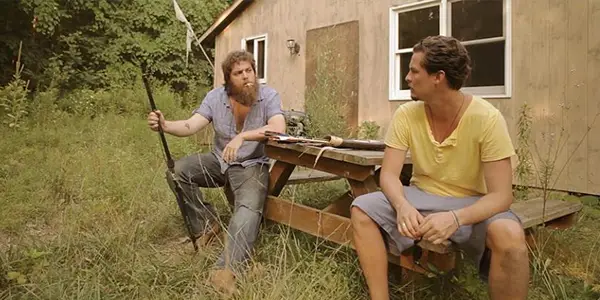
Made on a budget of only $6000, Jeremy Gardner’s The Battery is an extremely fresh take on the zombie genre and proves that audiences will always respond to a slow-burning character study if they are written and executed well. Gardner wrote, directed and stars in the film about 2 baseball players Ben and Mickey (Gardner and real life friend Adam Cronheim) who are forced to become friends as they travel across a vast zombie-filled wasteland. Gardner uses aspects of the ‘mumblecore’ movement and enough horror elements to keep the plot moving, supported by the script which is very well-written, which makes the characters very entertaining to watch.
The film is packed with original ideas and it understands that sometimes less is more. The dialogue drives this film, which strives for realism and feels improvised, which adds some dimension to the character and elevates the film above its budget restrictions. A big recommendation for this film, for anyone that wants to make movies or who want to see a fresh film in a sea of predictable shlock (the zombie genre).
4. 12 Angry Men (Remake) (1997, William Friedkin)
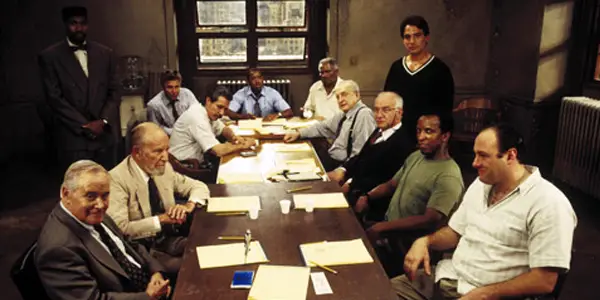
Whilst the original Sidney Lumet film is a classic, 12 Angry Men is a great modern-day adaption, which translates the material well for a modern audience. Originally made for TV, the film features an extremely recognisable cast, such as Jack Lemmon, James Gandolfini, George C. Scott, Mykelti Williams, Edward James Olmos and Ossie Davis, is a great selection of actors and makes the whole film worth watching for them alone. For people unaware of the story, the film details an all-male jury as they decide if a unnamed man is guilty of murdering his father. Whilst they are 11 of the 12 jurors instantly think he’s guilty, one unsure juror slowly starts to break down the case and turn the other member’s minds around.
Friedkin goes for quite a controlled approach here, using the minimalistic nature of the original film to his advantage, whilst giving it some slight visual tweaks for it to stand out. Friedkin really shows the rising temperature in the room, using some visual signatures that could be influenced by Spike Lee’s Do The Right Thing, such as intense lighting on the actors to highlight their warmness and uses of heavy warm colours to show the audience the increasingly uncomfortable atmosphere entering the room. Jack Lemmon does a great job as Juror #8 (Henry Fonda’s role in the original) who is clashing with George C Scott, who delivers a devastating performance as Juror #3, the man adamant on making the accused boy guilty. George C Scott and Jack Lemmon had clashed before on another remake, Inherit the Wind in 1999, but sadly that film has never been released on any home media.
5. Green For Danger (1946, Sidney Gillat)

In a British hospital during World War 2, a postman dies during surgery and a nurse states that it wasn’t an accident, but a murder and she knows who did it. After this, the nurse is killed, leaving the remaining 5 staff of the operating theatre to start pointing fingers at each other, so it’s up to the odd Inspector Cockrill (Alastair Sim) to solve the case in one night before the murderer strikes again. Due to most of the movie happening in one night, the film employs the classic murder-mystery structure made famous by the film adaptations of Agatha Christie, where the audience is given the set-up and slowly solve the murder along with the characters, with clues being delivered through the on-going dialogue of each suspect.
What elevates this film above most single setting murder-mysteries is the character of Inspector Cockrill, who is played in a very humorously eccentric way by Alastair Sim, who injects the character with enough humour and wit which makes him quite rememberable, raising the film above other’s of the same type. Cockrill toys with each suspect, merely using them as game pieces for his own delight as he slowly starts to put the pieces together as to the how and why of the 2 murders and what is going to happen next. The film has been mostly forgotten nowadays sadly, which is a shame because it’s a comedic murder-mystery which is still entertaining to watch now.
6. The Last of Sheila (1973, Herbert Ross)
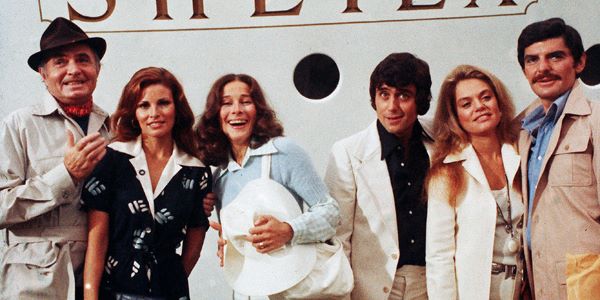
One of the most rewarding films to rewatch, The Last of Sheila is one of the most taughtly-written scripts which features dialogue that is essential for audiences to pay attention to. The film also shows us that dialogue-heavy murder mystery films can be just as exciting and smart without resorting to expansive action set pieces or talking down to its audience.
The extremely intricate plot is about Sheila, a rich socialite who is killed in a hit-and-run car accident. A year later, her millionaire husband Clinton (James Coburn), invites 6 of his friends on a yachting trip to play a murder-mystery game, the 6 people being the 6 suspects of the car accident. The murder-mystery is set-up to slowly reveal secrets about each member, to determine the killer. Things don’t exactly go down that way and a lot of plot twists and surprises are instore. Written by Stephen Sondheim and Anthony Perkins (a pretty random mashup), the plot is very dense in its setups and various clues featured throughout the film. The dialogue is also very sharply-written, it’s a film that demands you pay attention to get full satisfaction out of it.
7. Talk Radio (1988, Oliver Stone)

Set entirely within a radio station, Oliver Stone really shows off his directing chops by making this heavy-dialogue film very engaging, slowly raising the tense atmosphere as the film goes on and making great use of his actors. A controversial talk show host Barry (Eric Bogosian) learns in the middle of his heated radio show that he has been picked up to go ‘national’, to be broadcast across the entirety of the United States. Juggling with this news, his girlfriend problems, his staff and a neo-nazi group that’s starting to get irritated at his political views, Barry has a lot going on for him.
Being a film about radio, the dialogue is quite important and is one of the more engaging factors of Talk Radio. Whilst you might not agree with Barry and his views, his passionate delivery and commitment to his views makes the character interesting and you slowly start to understand what type of person he is and why people around him react the way they do. The film was originally a one-man play created by Eric Bogosian, between him and Stone they do a great translation of a one-man stage show and able to incorporate more cinematic aspects to really expand on the story and make it an entertaining film without stripping the original play of what made it work.
What are some more great dialogue-driven films that we missed?
(top image: My Dinner With Andre – source: New Yorker Films)
Does content like this matter to you?
Become a Member and support film journalism. Unlock access to all of Film Inquiry`s great articles. Join a community of like-minded readers who are passionate about cinema - get access to our private members Network, give back to independent filmmakers, and more.













